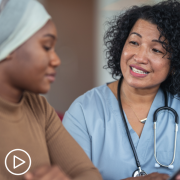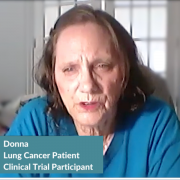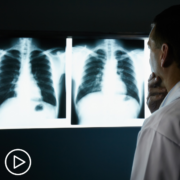BIPOC Lung Cancer Patients and Health Disparities
BIPOC Lung Cancer Patients and Health Disparities from Patient Empowerment Network on Vimeo.
What do some BIPOC lung cancer patients experience in terms of health disparities? Experts Dr. Nicole Rochester and Dr. Olugbenga Okusanya explain health disparities at the different stages of lung cancer diagnosis and treatment – and note differences in diagnosis and survival statistics.
See More from Best Lung Cancer Care No Matter Where You Live
Related Resource:

|

|

|
Transcript:
Dr. Nicole Rochester:
So I want to talk about racial and health disparities, ethnic and health disparities, specifically in lung cancer care. I know that you have done some research in this area, and certainly being a person of color, this is something that I would imagine you relate to, so we know that the CDC and many other healthcare organizations have now declared racism a public health crisis, and certainly in 2021, we continue to see worse outcomes for cancer and many other chronic illnesses in people of color, so I’m curious, what do you think are the notable health disparities that are consistently seen in treating BIPOC patients living with lung cancer?
Dr. Olugbenga Okusanya:
Yeah, unfortunately, this is an area of interest of mine. And it turns out that the disparities are literally every single stage, there’s not an aspect of lung cancer care, which there is not a significant disparity that hinders the ability of minority patients to get better care, period at all stages. So overall survival for lung cancer for Black patients is worse than white patients, even though Black patients get diagnosed on average two to three years younger than their white counterparts. Black patients are less likely to get surgical therapy for early-stage disease, which is the actual care for an early-stage disease dates than Black patients, than white patients, that gap has been narrowing over the last 20 years, but it is by no means closed. Black patients are unfortunately less likely to get an appropriate work-up to get the indicated tests. They are also less likely to get the chemotherapy when it is indicated, and they are less likely to be enrolled in clinical trials. So, literally at every step there is a significant inequity that affects Black patients, and I think it’s really disheartening to see in a field where lung cancer is the most common killer and cancer, and frankly, there are lot s and lots of patients who have options, who have good options that never get investigated and never get delivered.
Dr. Nicole Rochester:
That is extremely heartbreaking, and it’s sad to hear that we see the same disparities in lung cancer that we see with every other chronic condition, with every other cancer, certainly what we’ve seen recently with COVID-19 as well. And it really underscores what you said previously, which is the importance of being an advocate for yourself and doing your research and making sure that you really are getting the best care.





![[ACT]IVATED Program Logo [ACT]IVATED Program Logo](https://powerfulpatients.org/wp-content/uploads/Program-page-image-option-1-180x180.png)




